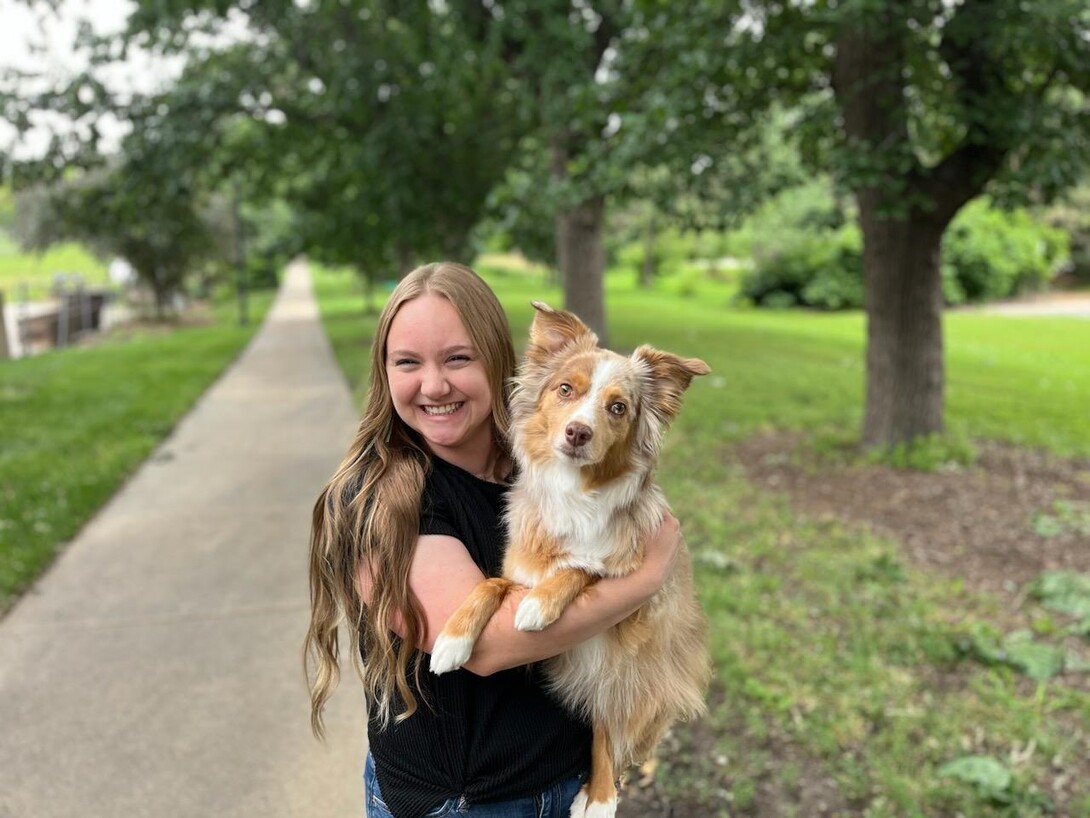
Editors Note: This guest blog is written by Morgan Marquardt, a University of Nebraska- Lincoln master’s student studying animal science with a specialization in animal welfare.
Lincoln, Neb. —
Finding belonging in animal welfare science
There is something innately rewarding about the relationship between animals and those who care for them every day. Those who have experienced it get it. To many, including me, living alongside animals just feels “right.” This bond, often referred to in the literature as the human-animal relationship, has permeated nearly every part of my life. I delight in the relationships with the animals in my life, and I find joy in seeing the beauty in these relationships for others.
For a long time, I struggled with fit. I struggled to find where my deep appreciation for kinship with animals “fit” in the animal science community and society in general. I spent much of my life, and most of my academic career, searching for a career path that would allow me to direct my energy towards improving this relationship for the countless people and animals who do life together every day.
Towards the end of my undergrad career, I met my current academic advisor and soon learned that we share an interest in how human handlers impact the animals they work with. This discovery perfectly captured the things I value in my life and my career, and this type of research would allow me to help people better care for their animals. Up to this point, I’d never met someone who dedicated their life, and their career, to their deep love for animals. I felt seen and understood in a way I hadn’t before. The only catch: her research is focused on cattle- a species I hadn’t worked with before and knew very little about.
I interpreted this massive fork in the road as an opportunity. My background with companion animals is a valuable part of my experience. Learning about production animals will be, too. Learning about cattle has been an incredible experience, and I have found that they’re fascinating animals. I’ve developed a deep admiration for them and the people who care for them.
Handler Skill and Safety Research
Interactions between cattle and humans can greatly impact animal welfare and handler safety. The outcomes of these interactions are influenced to a great degree by the handler’s skill level. Currently, the industry relies on self-reported years of experience working with cattle as a metric to quantify a handler’s skill level and as a qualification for working with cattle.
While an individual’s lived experiences are certainly valuable contributions to their skill level working with cattle, solely measuring years of experience does not provide a holistic assessment of skill. It completely overlooks other contributing factors, such as formal education. Additionally, this metric lacks reliability and consistency across handlers due to the lack of guidelines describing what constitutes handling experience.
The absence of a consistent metric for determining skill level puts cattle and their handlers at risk. Quantifying handler skill level would provide an objective assessment of skill and a reference point from which people can measure improvement. Objectively measuring skill level will contribute to improved animal welfare and a safer work environment for human handlers.
Connections between species and hope for the future
The very limited amount of literature that addresses cattle handler skill acknowledges the importance of skilled handlers but fails to describe what it means to be highly skilled in this role. This is a huge contributor to the gap between what is measured by years of experience and what skill actually consists of. Without clarity about what contributes to a skilled handler and how skill level should be measured, the industry relies on a metric that is unrealistic and dangerous. Working with animals is a dangerous occupation by nature, and the current tools to increase handler safety are not adequate for preventing all injuries.
This lack of support for the safety of animal handlers transcends the cattle industry. Currently, most occupations that involve working with animals to any degree consider applicants’ years of experience working with animals as a factor that largely determines their ability to perform well in their position. The heavy reliance on this metric across species is risky for all of the people who make their living caring for animals, and it stands to impact the well-being of all of the animals those people are in contact with on a daily basis.
Whether they work at a feedlot, a vet clinic, or a pet care facility, animal handlers deserve an increased sense of safety associated with their roles in caring for animals. I see a huge opportunity for my work to impact the lives of people who work with all kinds of animals.
Today, I’m in a position where I have an opportunity to add to the knowledge available to cattle handlers. I feel blessed to have this opportunity, and I’m excited to see what the future holds.







